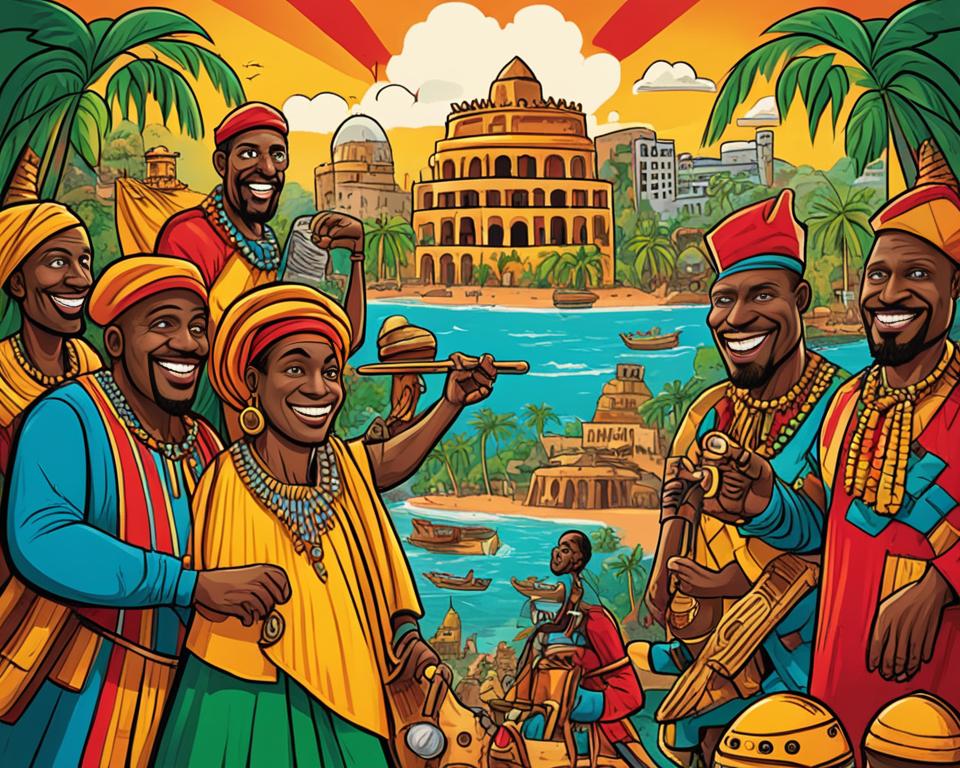Guinea, a West African country with a vibrant culture and history, also has a burgeoning film industry that deserves recognition. From thought-provoking narratives to exploring taboo subjects, Guinean cinema offers a unique perspective on the country’s identity and social issues. In this article, we will take a closer look at some of the best movies from Guinea, showcasing the talent and creativity within the Guinean film industry.
Key Takeaways:
- Guinea has a rich history of cinema and a growing film industry.
- Movies from Guinea reflect the country’s culture, history, and social issues.
- The Guinean film industry offers a diverse range of narratives and perspectives.
- Exploring movies from Guinea provides an opportunity to appreciate the talent within the country’s film industry.
- These movies shed light on colonialism, independence struggles, taboo subjects, and societal changes.
Table of Contents
Allah Tantou (1991)
Explore the compelling Guinean film, “Allah Tantou,” released in 1991. This thought-provoking cinematic masterpiece delves into the impact of colonialism and the struggle for independence in Guinea. It offers a poignant reflection of the historical and political context of the country and holds a prominent place in Guinea’s filmography.
Written and directed by Rahmatou Keïta, “Allah Tantou” weaves together the personal journey of the filmmaker, exploring her own family’s experiences during Guinea’s fight for independence. The film seamlessly intertwines historical footage and Keïta’s intimate conversations with her father, highlighting the deeply emotional and personal nature of the story.
Through powerful storytelling and captivating visuals, “Allah Tantou” portrays the perseverance of the Guinean people and their quest for freedom. This Guinean film, with its relevance and significance, has left an indelible mark on the country’s film industry.
Main Cast
| Actor | Role |
|---|---|
| Mamadou Seli Séras | Raoufou |
| Amira Kodaga | Imani |
| Aï Keïta | Young Rahmatou |
Dakan (1997)
Dakan, released in 1997, is a groundbreaking Guinean film that addresses homosexuality and societal taboos. It tells the story of a same-sex relationship and the challenges faced by the couple in Guinean society. The film offers a unique perspective on social issues and is considered an important contribution to Guinea’s film industry.
The film explores themes of love, prejudice, and societal expectations through the lens of a forbidden romance. It delves into the complexities of identity and the struggles faced by individuals who defy societal norms.
Dakan received critical acclaim for its bold storytelling and powerful performances. It challenged existing taboos and initiated conversations on LGBTQ+ rights in Guinea. The film’s impact extended beyond the confines of the country, influencing discussions on acceptance and inclusivity worldwide.
Cast and Crew
| Director | Producer | Main Cast |
|---|---|---|
| Cheick Fantamady Camara | Gerard Lacroix | Mamady Mory Camara |
| Mohamed Camara | ||
| Habibou Diallo |
Dakan broke barriers and paved the way for more inclusive and diverse storytelling in Guinea’s film industry. It remains a significant entry in the country’s cinematic history and a testament to the power of film as a catalyst for social change.
Le Ballon d’Or (1994)
Experience the thrill of football in Guinean film with “Le Ballon d’Or.” Released in 1994, this captivating movie takes you into the world of football, exploring the dreams, aspirations, and challenges of young football players in Guinea. From dusty street pitches to local tournaments, the film showcases the passion and love for the sport in the country.
Written and directed by Cheik Doukouré, “Le Ballon d’Or” immerses viewers in the colorful atmosphere of Guinean football culture. As the story unfolds, you’ll witness the perseverance of the young athletes, their dedication to the game, and the obstacles they face along the way. The film captures the vibrancy and enthusiasm that football brings to communities in Guinea.
Through its authentic storytelling and compelling performances, “Le Ballon d’Or” offers an engaging cinematic experience for both football enthusiasts and lovers of Guinean film. It beautifully portrays the universal themes of aspiration, camaraderie, and the pursuit of dreams.
To get a taste of the excitement and passion that football evokes in Guinea, make sure to add “Le Ballon d’Or” to your must-watch list. This Guinean film is a testament to the talent and creativity within the Guinea movie scene.
| Title | Release Year | Director |
|---|---|---|
| Le Ballon d’Or | 1994 | Cheik Doukouré |
Enfant noir, L’ (1994)
“Enfant noir, L’ (1994)” is a powerful Guinean film that delves into the experiences of a young black child growing up in a racially divided society. The film portrays the challenges and discrimination faced by black individuals in Guinea, shedding light on important social issues. Through its thought-provoking narrative, “Enfant noir, L'” contributes to the exploration of racial injustice and inequality in Guinea.
Key Themes
- Racial discrimination and prejudice
- Identity and self-discovery
- Social inequality
Directed by Ousmane Sembene, the film skillfully depicts the protagonist’s journey as they navigate a society marked by systemic racism and limited opportunities. With its poignant storytelling and compelling performances, “Enfant noir, L'” captivates viewers and prompts deep reflection on the impact of racial divisions.
In portraying the lived experiences of a young black child, this Guinean film sheds light on the wider societal issues of racial injustice and discrimination. It serves as a powerful medium for raising awareness and fostering dialogue around these important topics.
Through its portrayal of the challenges faced by the young protagonist, “Enfant noir, L'” invites audiences to critically examine the complexities of race and society. It urges viewers to confront their own biases and prejudices, encouraging empathy and understanding.
By addressing these pressing social issues, “Enfant noir, L'” occupies a significant place within Guinea’s filmography. It contributes to the country’s cinematic legacy by amplifying marginalized voices and prompting meaningful conversations.
| Title | Director | Release Year |
|---|---|---|
| Enfant noir, L’ | Ousmane Sembene | 1994 |
Il va pleuvoir sur Conakry (2007)
“Il va pleuvoir sur Conakry,” released in 2007, is a critically acclaimed Guinean film that delves into the clash between tradition and modernity in Guinea. Set in Conakry, the capital city of Guinea, the movie follows the journey of a family navigating through cultural and social changes. It provides a thought-provoking portrayal of the evolving Guinean society, examining the tensions and complexities that arise when traditional values confront the influences of the contemporary world.
Directed by Cheick Fantamady Camara, “Il va pleuvoir sur Conakry” offers a compelling narrative that sheds light on the challenges faced by individuals and communities grappling with the forces of progress and tradition. Through its engaging plot and well-developed characters, the film captures the essence of Guinean culture and explores the universal themes of identity, family, and societal transformation.
The movie showcases the talent and creativity within the Guinean film industry, solidifying its position as an important contributor to African cinema. With its critical acclaim and powerful storytelling, “Il va pleuvoir sur Conakry” has played a significant role in promoting Guinean cinema on the global stage.
Key Themes in “Il va pleuvoir sur Conakry”
The film addresses several key themes, including:
- The clash between tradition and modernity
- The impact of societal changes on family dynamics
- The tensions arising from cultural and religious influences
- The search for identity in a changing world
- The struggles faced by individuals caught between tradition and progress
Awards and Recognition
“Il va pleuvoir sur Conakry” has received widespread recognition and acclaim both within Guinea and internationally. Some of the notable awards include:
| Award | Year |
|---|---|
| FESPACO (Panafrican Film and Television Festival of Ouagadougou) | 2007 |
| San Francisco International Film Festival | 2007 |
| Cartagena Film Festival | 2008 |
Conclusion
Guinea’s film industry has brought forth a captivating array of movies that encapsulate the essence of the country’s culture, history, and societal complexities. These films delve into themes such as colonialism, the struggle for independence, taboo subjects, and the transformation of Guinean society.
The carefully curated list of movies about Guinea presented above serves as a gateway to explore the remarkable cinematic achievements of the country. Each film offers a thought-provoking narrative, providing unique insights and perspectives that resonate with audiences. From “Allah Tantou” reflecting the historical and political context of Guinea, to “Dakan” challenging societal norms, “Le Ballon d’Or” capturing the passion for football, “Enfant noir, L'” shedding light on racial discrimination, and “Il va pleuvoir sur Conakry” exploring the clash between tradition and modernity – these films showcase the diversity and talent within the Guinean film industry.
Indulge in the cinematic journey through Guinea’s compelling stories, and gain a deeper understanding of the country’s heritage and the challenges faced by its people. The movies about Guinea celebrate the power of storytelling, transporting viewers into the heart of Guinean culture and leaving a lasting impression.


